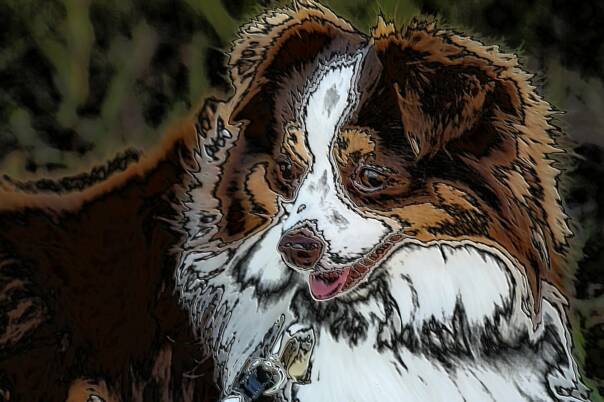
House Training Your New Puppy
Housetraining means that you are training your puppy to urinate/defecate outdoors. Remember that your Aussie wants to please you and will try its hardest to do just that. Your puppy will learn faster if you use positive praise and affection.
When you are unable to be home (or unable to pay 100% attention to the pup) never give your puppy full access of the house before they are one year of age. They are still too immature at this time of their life. Confining them while you are away or busy (in room with child safety gate) is the safe choice as well as the best and easiest way to housetrain.
Feeding times need to be scheduled after 12 weeks of age.
Accept that there WILL be accidents, your puppy’s body is still immature. Reward him when he goes outside with lots of praise, and ignore the accidents. This attitude will speed up his learning.
1) Put the puppy on a schedule after 12 weeks of age. You want to feed them at a certain time every day. Take them outdoors to urinate/defecate at the same times each day. First thing in the morning, before feeding them or even feeding yourself, let them out to urinate/defecate. Then, after you feed them in the AM, let them out to urinate/defecate again. Repeat this after each feeding and watering each day. Praise them once they have done their business outside! You puppy will learn much quicker with positive praise. For a general gauge to go by: Puppies from 8 weeks to three months of age should be fed 4 times a day, puppies 3 months of age to 6 months of age should be fed three times daily. When the dog reaches 6 months of age to 1 year of age, they should be fed twice daily. Then, when the puppy is over one year old, they can be fed either once or twice daily. Give the puppy water every 3 to 4 hours, which is about four to five times a day. After he drinks, take the puppy outside to urinate/defecate (this means you will be bringing the puppy outdoors about 5 to 6 times each day).
2) Be sure that your puppy is given a proper diet. Before bringing your puppy home from the breeder, ask the breeder what they have been feeding the puppy and continue feeding the same feed (same brand and flavor, if applicable) as well as the same amount. If you wish to change feeds, be sure to do so gradually by adding a little bit of the new feed with the old each day (this change should be made over period of 7-10 days). Avoid giving your dog table scraps.
3) The last water given to the puppy should be around 7:30PM, and yet another trip outdoors to urinate/defecate. Then, the last time to take them outside in order to urinate/defecate should be around 11:00PM. (This last trip outside is up to you - whatever time you normally turn in for the night, just keep it at the same time over the weekend as well)
4) At first, you must choose one type of housebreaking. Either you train your puppy to urinate outdoors, or you paper train your puppy. This is where the puppy urinates/defecates indoors in a predetermined area, such as on a hard floor upon newspapers or puppy pads. You must choose one, not both. This avoids confusion. You might want to paper train a puppy and then when they are around 6 months of age, train them to potty outside only. The transition should not be difficult for a young dog this age.
5) The young puppy needs some area of confinement - they shouldn’t have complete run of the house, especially prior to housebreaking and during the housebreaking process! Confinement can be within the kitchen; it's a great choice since it usually has a hard floor and doesn't have wires or tempting remote controls laying around! Also, using a child safety gate helps keep them from running about the house and soiling other rooms. It also serves to save them from other dangers around the home as well.
6) Get rid of odor from accidents with a neutralizer so that there will not be any trace of scent for the dog to return to. If dogs can smell previously soiled areas, they are likely to return to that area and soil it again. Products such as Nature’s Miracle do this job perfectly.
7) If you ever catch you puppy in the act of urinating/defecating where you don’t want them to, do not yell at them! This will scare them; scaring an animal actually MAKES them urinate/defecate out of fright. What you should do if you catch your puppy starting to urinate/defecate is to startle them into stopping. What you want to do is simply give a firm "NO" and bring them outside right away, saying "good dog" once they urinate/defecate outdoors.
8) Housetraining your new puppy should only take a few weeks or so, depending on their age. Not only will you have a home that is cleaner, you are instilling self esteem in your dog by teaching him a particular behavior pleases you greatly.
Crate Training Your Puppy
Click to go back to FAQ page


 | ||||||
The content and design of this website is copyrighted. Any reproduction without permission is illegal.